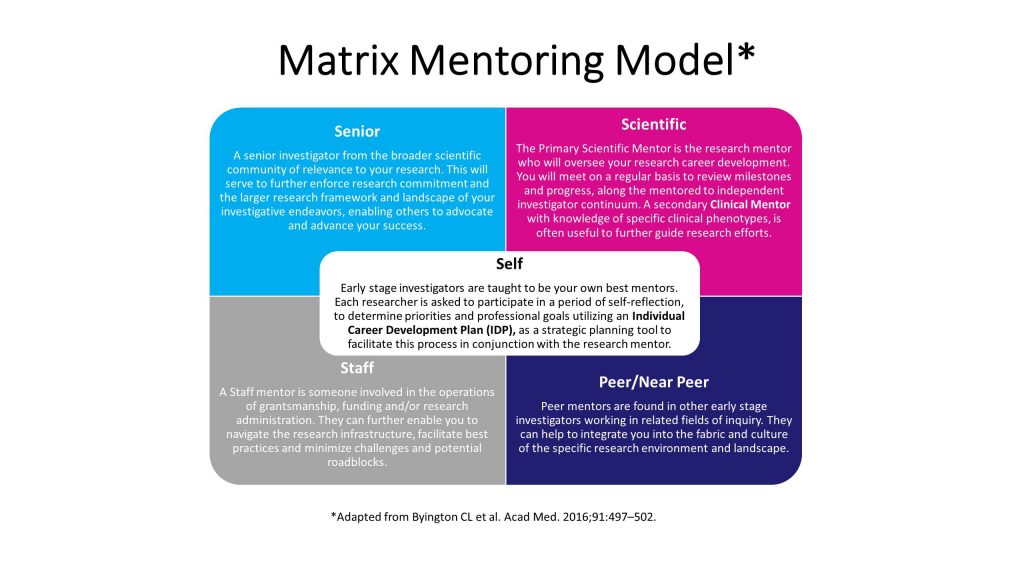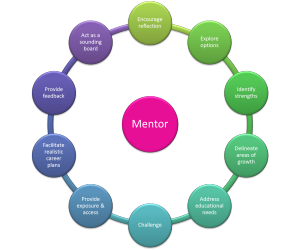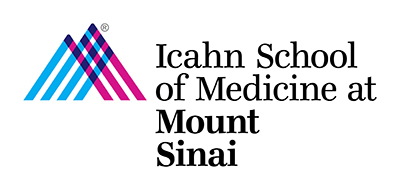Mentorship for Successful Career Development
Mentorship is instrumental to successful career development for Emerging Investigators. As an Emerging Investigator, finding a great mentor and using them appropriately is a critical ingredient to the successful transition from mentored to independent researcher. If you are a mentor, you can find resources valuable to your development in the Mentorship for Mentors corner.
Mentoring contributes significantly to your ability to realize your true potential in your field of interest and reflects a dynamic process between the mentor and the mentee that requires clarity of shared and aligned expectations, a structured work plan as well as constructive communication and feedback, in order to optimize the benefits of the mentor mentee relationship. In the highly competitive world of academic medicine, having an effective mentor can serve to help ensure a productive outcome. By providing guidance, support and advocacy, your mentor can help you successfully navigate the academic research landscape and move forward professionally. The interest, knowledge, strategic advice and the support of a mentor coupled with your own realistic goal setting, and proactive participation in your mentoring relationship, can provide you with compelling opportunities for personal growth and career advancement. There are several different types of mentors, which are often thought of as complementary and interlinked as part of a Matrix Mentoring Model.

What is Mentoring?
Mentoring is process in which an experienced individual provides support and guidance of another less experienced individual. More importantly, mentorship is developmental & symbiotic partnership and process through which one person shares knowledge, skills, information & perspective to foster the growth & independence of another.

What Should You Look for in a Mentor?
Firstly, think about why you need a mentor. We have included some suggestions below of the types of advice you might seek from a mentor. Who do you know who has experience in these areas?
• Career advancement
• Grantsmanship
• Publishing
• Teaching
• Enhancing professional visibility
• Networking with other scientists and practitioners
• Overcoming barriers to career success
Secondly, find someone who has established mentoring skills. Not all experts will make good mentors. You may want to look for someone who exhibits some or all of the following characteristics:
• Active listening
• Shows interest
• Builds Trust
• Determines goals
• Encourages
• Learns quickly
• Manages the relationship
Finally, think about mentor-fit. Who can you work with on an ongoing basis? Ask colleagues and peers about their experience of working with potential mentors to get a mentor who’s right for you.
• Prior successful mentoring experience
• Productivity of prior mentees
• Knowledge and expertise in field/area of research in which you are seeking mentorship
• Availability
• Access
• Time
• Shared inspiration
You may find the following resources valuable in helping you identify a suitable mentor:
Top Tips for Build a Successful Mentor-Mentee Relationship
Checklist for Mentees to Create, Cultivate and Take Ownership of a Successful Mentoring Relationships* 1. Getting Ready Start by clarify your values and knowing what you want from a mentor relationship. Identify your own work style and habits. Identify your knowledge and skill gap, which may be:
- Personal
- Professional development
- Skill development
- Academic guidance
- Research
List the specific opportunities you are seeking and write down your goals over time/key milestones (3 months, 1 year etc). 2. Finding a mentor(s) Meet with people you know and get recommendations. Ask the people you meet who else they might recommend. Find multiple mentors, both junior and senior. Find out who they have mentored before and get measures of success of prior mentees Be persistent! 3. Things to look for in a mentor Their availability and accessibility. Someone who provides opportunities and encourages you to take risks in a safe environment. Someone who helps you to develop own agenda. Someone who has prior mentoring experience. 4. The first meeting Tell your mentor how he or she has already helped you. Share your background, values and needs. Send a thank you note after the meeting. 5. Cultivating the mentor-mentee relationship Agree on structure and objectives of relationship. Plan and set meeting agendas. Ask questions and listen actively. Follow through on assigned tasks. Ask for and be receptive to feedback. Manage up
- Set goals and expectations
- Be responsive and flexible
- Direct the flow of information
- Follow a regular meeting schedule with agenda
6. Separation Talk about when the relationship should end. Talk with your mentor about next steps. Talk about future mentors. * Adapted from Zerzan JT, Hess R, Schur E, Phillips RS, Rigotti N. Making the Most of Mentors: A Guide for Mentees. Acad Med. 2009; 84:140–144.
Relationship Difficulties - Who Should You Ask For Help?
It is common for challenges to arise when working with your mentor. Anytime two or more people work together there are bound to be moments of tension or disagreement. There is ALWAYS someone you can go to if you are having difficulties with your mentor. This includes Ombudsman; Title IX Coordinators; Chairs or Chiefs of your Department or Division respectively; Directors of your training area: Office of Academic Development and Enrichment (OADE), Dean for Faculty affairs (Graduate School of Biomedical Sciences).
Mentee Best Practices
Useful Resources on Mentorship
Reources at the Icahn School of Medicine at Mount Sinai
- Postdoc Peer Mentorship program, offered via Trainee Health and Wellness (THAW)
- They also have a Facebook group that you can join here
- Office of Faculty Development (OFD): Mentorship Enrichment
- The Office of Postdoctoral Affairs: Mentoring Resources
- Department of Medicine: Junior Faculty Mentoring
Resources from other organizations
- American Psychological Association: Centering on Mentoring
- American Psychological Association: Responsible Mentoring of Researchers
- Association for Women in Science: Mentoring
- Association of American Medical Colleges: Compact between Postdoctoral Appointees and Their Mentors
- Federation of American Societies for Experimental Biology: Individual Development Plan for Postdoctoral Fellows
- MentorNet: The E-Mentoring Network for Diversity in Engineering and Science
- National Academy of Sciences: Advisor, Teacher, Role Model, Friend-On Being a Mentor to Students in Science and Engineering
- National Institutes of Health: A Guide to Training and Mentoring in the Intramural Research Program at NIH
- National Research Mentoring Network (NRMN)
Relevant publications
- Zerzan JT, Hess R, Schur E, Phillips RS, Rigotti N. Making the Most of Mentors: A Guide for Mentees. Acad Med. 2009; 84:140–144.
- Pfund C, House S, Spencer K, Asquith P, Carney P, Masters KS, McGee R, Shanedling J, Vecchiarelli S, Fleming M. A Research Mentor Training Curriculum for Clinical and Translational Researchers. Clin Trans Sci 2013; 6: 26-33.
